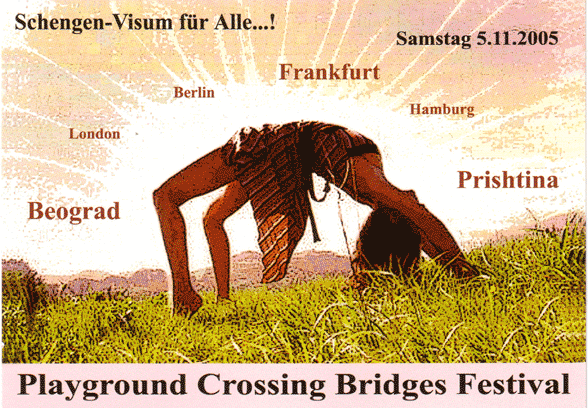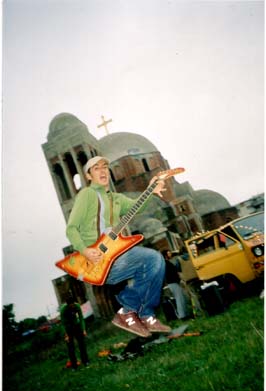Schengen-Visum
für Alle!
Playground
Crossing
Bridges Festival
on 5.November 2005
location:
Gutleutstrasse
294 / Frankfurt am Main

Schengen-Visum
für Alle! Playground location: |
 |
Intro
20.30 Opening: our guests from Radio Urban FM Prishtina, Crossing Bridges Collektiv and Stani Pani Collektiv/Queer Beograd present their groups&projects and talk about life and general situation in their cities/countries in Ex Yugoslavia.
21.30 Films about Road of Peace, Queer Beograd, Musicvideoclips...
Premiere: Under Construction Documentary
23.00 DJs, Live-Acts,Playground
and Films on 5 Floors:
Live
Digital Tuki(Stani
Pani Kolektiv/Lounge)
Moon
(QueerBeograd/Queeruption)
Lava303 (Acidrocknroll/Playground)
Steve Dragon(Kaleidoskop
Rec)
808 Toms(Holidays
in Kosov@)
DJs
(special guests)
Toton (Urban FM,Tekhouse)
Tishma (Stani Pani Kolektiv,Progressive Trance)
Raviv (TelAvivgoesBerlin)
Sonic(Chaishop)
Acidpopper (Mushroom Magazin)
DJs (local
heroes and more)
Gabriel le Mar (Saafi Brothers,Aural Float)
Michael Kohlbecker (Saafi Brothers, EB Records)
Stefan Ludley ( Psylofant)
Yan (Gecko)
David (Chill)
Rene (Lounge)
Battle of da bad Boys(Female Hip Hop,Ladyfest Frankfurt)
Club Kiew (Elektro/Drum n Bass)
Volkstanzkomitee
(Tanzmusik aus Osteuropa, Balkan ,Nahen Osten)
Afterhour
/ Kantina
Suse (LSDh,Ladyfest Frankfurt)
Harry Heide (Toxic Tunes)
und special guests
Extras:
Playground and Lounge
White Cube: Jonglierspielplatz, Firdancers, Performances, Gender Change Room
by Ladyfest Frankfurt, Bodypainting, Massage, Shisha Cafe, Alice Stand und Leseecke,
Playground Mailorder und Infostand....
Live Music Playground
live drums, guitars, bass MC, operated by Tautropfen
Documentary Films and Exhibition
in Kantina /Room2
zum Thema Crossing Bridges, Queer Beograd, women&female politicans in Kosov@
Playground Tours
Deko,Projections,Lights
by Ivanna, Stani Pani Kolektiv,Mana Traya, Linke Schwestern des Hedonismus,
Club Kiew, Jo
VJ Kunst and Documentation
Petra (Ladyfest Frankfurt)
Jan
Tickets: before 23.00:
6 Euros
after 23.00: 8-10 Euros
Get a member of playground association (www.theplayground.de) for 20 euros,
get half entrance and one Acidrocknroll CD for free.(www.acidrocknroll.org)
more infos about the festival, final line up,links www.theplayground.de/crossingbridgesfestival.htm
background,
projects and actions:
www.theplayground.de/news.htm
November 5 / Frankfurt am Main |
|
Playground
collective is touring end of September to mid October, crossing bridges
to Kosovo und Macedonia again to play music and party. Fireshows and a
juggling workshop for unprivileged kids will be held. Thereafter longtime friends and partners Stani Pani Collective (PGA, Queer Beograd) and Radio Urban Fm (Road of Peace) from ex-Yugoslawia will party in Frankfurt Tanzhaus West/Kantina at Crossing Bridges Festival. Those activists, filmmakers and DJ's will talk about life in Belgrade and Prishtina, display films and art or play their music. Lots
of other festival guests were participants at earlier Crossing Bridges
Festival, »Holidays In Kosovo«-CD, Playground tours and Queer
Beograd. more Infos, pictures and final (lineup) one week before crossingbridgesfestival.htm |
 |
Film Premiere:
Outside the Framework
UNDER CONSTRUCTION SERIES
In 2003 and 2004, a Kosova based documentary team traveled throughout the countries of ex-Yugoslavia and Albania, filming and interviewing their neighbors about the issues that have been present and relevant to everyone of the region since the fall of communism and recent Balkan wars. The Outside the Framework Documentary Series shows this region undergo its extreme changes through the voices of ex-fighters, local journalists, musicians, activists, Romas, and other interesting and un-common characters. Each episode of this six part series focuses on one special theme, weaving together the perspectives of people from each country.
PRODUCED BY
· Crossing Bridges
· i’s continuum
· Radio Television Kosova
EXPECTED RELEASE Fall 2005
SERIES LENGTH 6 x 26 minute episodes
FINANCED and SUPPORTED BY
· Press Now, Amsterdam
· German Foreign Office through the Stability Pact for South Eastern
Europe with support of IFA/Media-Im-Pakt
· United States Office, Pristina
· Kosovo Ministry of Culture, Youth and Sports
COMMITTED BROADCASTERS
· Radio Television Kosova
· Public Broadcasting Service, Sarajevo
· Radio Television B92, Belgrade
CONTACT
Casey Cooper Johnson, Producer
Crossing Bridges
Prishtina, Kosova
+377 44 220 627
crossingbridges@gmail.com
cooperjohnson@yahoo.com
www.crossingbridges.org
EPISODE THEMES
1. Collective Memory: Despite the many differences that people of the Balkans have between each other, they all carry the same memories and the same problems. The post-war hardships and ‘new’ rules of living have made many people look back into the past with nostalgia for the communist times. For some others, the hardships of today are the proofs of the mistakes made in the past. This episode will focus on the ordinary people, their lives, their memories of yesterday and their hopes for tomorrow.
2. Disposable Heroes: The ones who fought in the recent Balkan wars were, in the beginning, adored heroes for the masses. As time progressed, they were pushed back to the margins, treated as a nuisance by their governments. Though the reasons they went to war may differ, the general outcome was the same for all of them. Usually unemployed, struggling with the insufficient help from their governments, most of them feel abandoned by the societies they have fought for. This episode gives a picture of the Balkans through the eyes of those who were executioners and victims of their creation.
3. News Goes Out: Free media is a term, which is still relatively new in the Balkans. Very few of them now functioning have more than 10 years of experience, a big part of which was oriented towards fighting or trying to evade the regimes of the 90’s. At the same time those regimes who inherited parts of old Yugoslav Television network kept up the tradition of centralized government media, aware of the power propaganda may have in troubled times. After the fall of war time regimes, the newly elected governments have tried to find new ways of influencing the media. This episode shows the slow development of Balkan media from the times of one party - one truth for all, to today’s spread of more confusion than truth.
4. Unsatisfied: Social activism in the Balkans started in the early 90’s, mainly as response to growing tensions and wars. For a considerable time, they were the only voices saying “something is wrong”. As the wars came to an end, so did the social activism also change direction. By the end of 90’s, social activists ranged from anti-militant, to pro-reconciliation work, or to anarchism. This episode looks at the development of social activism in the Balkans, from the time when saying “NO” was the only form of progressive thinking, up to today’s crucial role of these movements to educate citizens of their power to choose in post-communist systems.
5. Of Mice and Men: The people of the Balkans have always been connected to music. For a long time music has followed the development of the societies, reflecting the changes of the past 15 years. During the 90’s, musicians portrayed the feelings of generations caught up in wars they did not fully understand. More often than not, musicians were on the forefront of anti-war movements, hence speaking the minds of thousands of young people. Today’s musical scene still portrays a picture of the musician’s surroundings - places caught between tradition and globalization. This episode reveals the power of music as an instrument for social influence and a reflection of the times.
6. A Roma Story: It is believed that the Roma are the largest ethnic group in the world with no territory to call “their country”. Widely uneducated and living underneath poverty line, for most Europeans they are what is usually called “second class citizens”. The Balkans are no exemption to the rule. Birth of ultra nationalism has often made them the scapegoats. So, while other nations of the Balkans were waging wars for their re-found nations, Roma’s began to struggle for their status inside the frameworks of the newly created countries. This episode looks at the living conditions and the status of the Romas throughout the Balkans, with special emphasis on their new institutional struggle to secure better living.